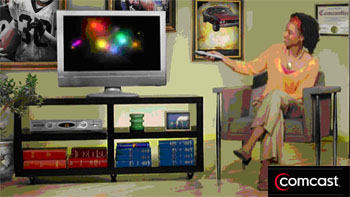
Comcast published the results of a study earlier this month claiming that viewers preferred Comcast HD signals to HD transmissions from Dish Network and DirecTV. The study was conducted by Frank M. Magid Associates with oversight by Accenture and the law firm Loeb & Loeb.
Now DirecTV is suing Comcast for claiming better quality HDTV in its advertising. According to the complaint, the study does not sufficiently substantiate its claims.
You can head on over to NewTeeVee for a discussion of why DirecTV is pursuing this lawsuit. In the meantime, I have to wonder how relevant a HD test like this is to actual viewers. So much of HD quality comes down to the original source material, and the quality of video recorded for broadcast varies widely today. There’s also the issue of how good your HDTV display is, and how the video has been compressed during the encoding process.
In short, you can’t get the best HDTV by simply picking one television service over another. It just ain’t that easy.
Your point is true, it is a complex issue to evaluate an HD signal. However, there is definitely some truth to be had in Comcast’s claims. I’ve had DirecTV HD in the past, and I know that due to bandwidth constraints they way overcompressed the MPEG-2 streams. This is why they’re switching to MPEG-4 now, but most customers are still using the MPEG-2 boxes and can’t access MPEG-4 streams without new equipment. DirecTV made a mistake in not getting enough satellites up and not having enough bandwidth to meet the demands of HDTV and Comcast is just trying to capitalize on their mistake. I can tell you from personal experience that the Comcast HD signal that I receive is unquestionably better than the one that DirecTV was sending me when I left them.
Comcast obviously didn’t conduct the tests using TNT. ;)
Most folks won’t choose a provider based on “HD quality” (assuming they realize/notice a differene), but rather price or lineup. DTV’s NFL package drives a ton of business.
What’s odd is that it’s Comcast and DirecTV battling it out over HD-quality, where the real winners would be OTA HD reception and FiOS TV, neither of which compress their HD signals, unlike the first two providers.
HD quality is a perplexing issue for me. It seems like half the time I notice fuzziness for the NBA playoffs during “quick sequences” and half the time I don’t notice it. I have a 720P Sharp Aquos with Series3. Should I take back the Aquos or what? Charter is the provider.
During the NCAA tourney, one of the Maryland games was (incorrectly) being broadcast in SD. I called Comcast and the local CBS affiliate who both said CBS in NYC was transmitting the wrong feed. Of course, I didn’t believe either of them and pulled out the rabbit ears… They were right, it was also in SD. Not sure what the lesson here is…
MC: Are you down converting the 1080i signal to 720p? A lot of people do that and don’t realize how bad it makes fast action content look. 1080i *can* look good for sports, but only if you have a display that handles it well.
Tom: I’m sure you already know this but of course both OTA and FioS if it doesn’t compress the OTA signal transmit the OTA HD content compressed, just not as compressed as Comcast and DirecTV…
RR: I’ll take a look at my settings again. However, I don’t think my tv does 1080i. It is 1366 x 768.
Thanks.
Most cable companies compress 6 to 1 with premium channels 3 to 1. Direct used to do 8 to 1 with some as high as 12 to 1 …
This was correct one – still correct?
Fox HD, ABC HD & ESPN HD broadcasts in 720p. NBC, CBS, Discovery and PBS broadcasts in 1080i
to get the full uncomprssed – you probably need to get these over the air but I cannot confirm that. Your thoughts?
Espn, Fox, cbs, etc.. are broadcasting 720 because they carry the nfl. The nfl broadcast in 720.
If you watch sports definitely get 720 hdtv; 720 is supposedly better for faster paced stuff like sports. The 1080 is better for movies, so they say.
It is true that the satalite providers have limited bandwidth and do need to compress. Plus there is latency going from satalite to the dish. The cable companies though are doing some compression too, as they need the extra space to carry their broadband internet. The cable companies, however, are all fiber now which has significantly more bandwidth, so the compression they need to do is less.